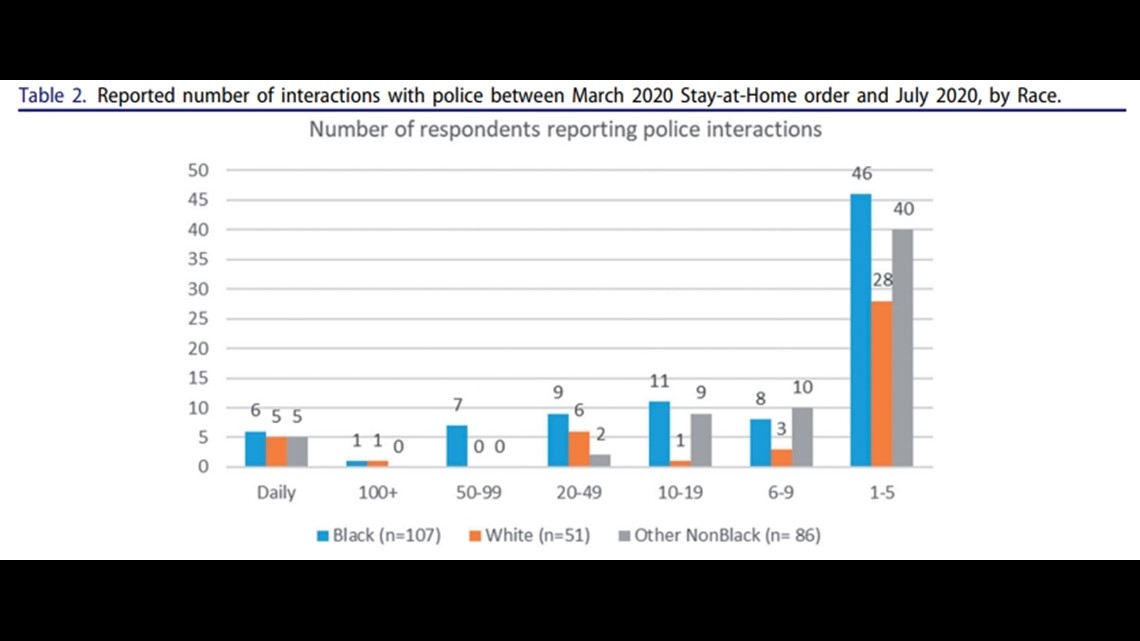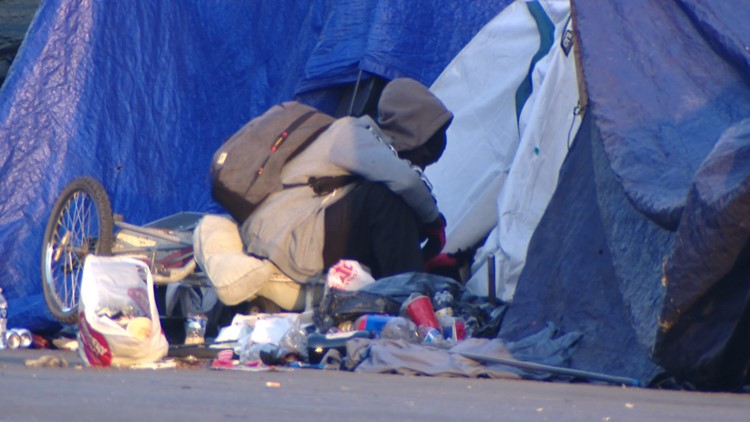SAN DIEGO — Researchers at San Diego State University say negative interactions with police are driving Black people who are experiencing homelessness away from services and housing opportunities.
In a newly released study entitled, "Black Lives Experiencing Homelessness Matter: A Critical Conceptual Framework for Understanding How Policing Drives System Avoidance among Vulnerable Populations," SDSU researchers say they found 'overt' racism in the manner that San Diego Police deal with Black people living on the streets.
In the study, a total of 244 homeless individuals were surveyed from March 2020 through July 2020. The respondents, regardless of race or ethnicity, reported high rates of interaction with San Diego Police officers. Black people, however, who represented nearly 46% of those surveyed, reported an even higher rate of police interactions than their white counterparts, according to the study.


The study's authors found a common theme among unhoused Black people living on San Diego's streets and sidewalks, "A theme that arose from our interviewees is a clear awareness of race and poverty-based profiling and treatment by police," reads the study.
During the course of their study, SDSU researchers said numerous people interviewed said officers used racist and homophobic slurs during their interactions with them.
Meanwhile, unhoused white individuals said they were aware of the racism and said that they received more favorable treatment than their Black counterparts.
According to researchers, the negative interactions mixed with encampment sweeps and police enforcement of encroachment laws result in skepticism and fear in trying to find shelter or resources. Instead, unhoused people of color, according to the study, say they are more apt to avoid police at any cost and instead search for remote areas where they can escape potentially negative interactions with police.
Because of their reluctance to seek help due to fear, many people experiencing homelessness, say researchers, are labeled as not wanting help and refusing the services offered to them.
Reads the study, "When individuals face apathy, discrimination, and disrespect, the result is a reluctance to seek services until problems become emergencies. Individuals are often interested in avoiding institutions, despite good intentions of some providers. This in turn drives stereotypes that people do not “want” help, when in fact, if people had a history of positive encounters with systems, they might eagerly embrace assistance"
And while researchers say much has changed since the study was conducted in the midst of the pandemic, they feel the overarching theme remains, that relying on police to be the first, and sometimes only, responders to those living on the streets is not the correct policy to address and solve homelessness.
"We argue that police should not be involved in addressing homelessness at all, given the pervasive lack of trust in the homeless community and the long and still unaddressed history of violence, especially of police agencies toward Black people," reads the report.
CBS 8 reached out to San Diego Police Department for comment on the report and to see whether the department plans to address any of the findings.
In a statement, a spokesperson for the city wrote:
"The City of San Diego aims to balance compassion with the need to address public health and safety issues. The City must follow several procedures when it involves individuals experiencing homelessness due to litigation, including posting a notice prior to abating any area and following a 4-step progressive enforcement model. Officers with the San Diego Police Department are trained in the progressive enforcement model that offers shelter or services at every interaction prior to any enforcement action being taken.
The San Diego Police Department provides regular bias training and has policies in place to ensure officer interactions with all San Diegans are of the utmost professionalism. If any officer is found to be in violation of those standards, disciplinary action is taken. Residents are encouraged to report any complaints to the San Diego Police Department for investigation.
While the San Diego Police Department acknowledges the impact police presence can have on persons with traumatic experiences involving law enforcement, the Department rejects the study’s blanket claim that police are barriers to those seeking services or are engaged in racial profiling when interacting with individuals experiencing homelessness.
Data from Operation Shelter to Home at the San Diego Convention Center (before a citywide outreach program was launched) shows that SDPD was the leading agency connecting persons experiencing homelessness to services. See attached.
The information and study being given tomorrow highlight the voices of persons experiencing homelessness. It fails to acknowledge other voices, including the community members and business owners being negatively impacted and who expect the police to deal with the myriad of associated problems of homelessness.
The San Diego Police Department conducted a survey last year regarding homelessness. https://www.sandiego.gov/sites/default/files/zencity-homelessness-survey-2022.pdf
The SDSU researchers will present their study to San Diego City Council during its March 14 meeting.



